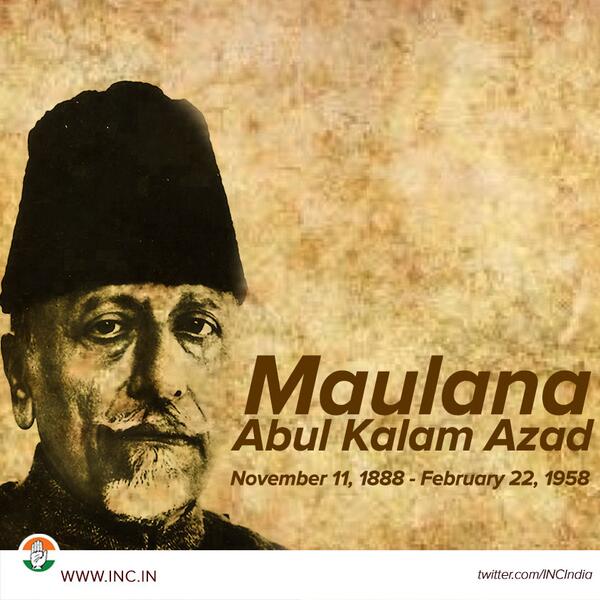
Abul Kalam Ghulam Muhiyuddin, also called Maulana Azad, molded the instructive arrangement of the nation as the principal instructive priest of autonomous India. He was a symbol of common patriotism who passionately restricted the division of the nation on mutual lines. This was in sharp differentiation to another prevalent Muslim pioneer of that time, Jinnah, who was progressively requesting a different Muslim country. For his commitment to building up the instructive framework in the nation, his date of birth, 11 November, is commended as the National Education Day. Azad passed away on 22 February 1958, abandoning a great inheritance.
Youth and early life
Abul Kalam Azad was conceived in Saudi Arabia in the city of Mecca on 11 November, 1880. Amid his youth he embraced the nom de plume of "Azad", which implies free. He increased Islamic instruction and furthermore learned subjects like rationality, math, science and world history from mentors at his home. His dad was a researcher named Maulana Khairuddin, a Bengali Muslim from Madina, and his mom Alia and a niece of the regarded Shaikh Mohammad Zahir Vatri. By the age of 17 he had earned a name for himself in the Islamic scholar circles. He contemplated advance at the Al Azhar University, Cairo, which had an imperative impact in molding his identity. His family settled in Calcutta later in 1890. Azad was an unmistakable relative of the ancestry of Maulanas.
Defining moment in the life of Abul Kalam Azad
Azad since his young age thought uniquely in contrast to the conventional Muslim ways. Shri Shyam Chakravarthy, a progressive, acquainted Azad with the Indian flexibility battle. The same number of opportunity contenders in Bengal were Hindus, it was very amazing to his companions to see a youthful Muslim join the battle. Be that as it may, he soon prevailed upon them as he went ahead to set up progressive exercises all finished North India and Bombay (now Mumbai). The greater part of the flexibility warriors were against Muslims, and Azad attempted to persuade them that threatening vibe towards Muslims would make opportunity troublesome.
He began the Urdu production Al Hilal in 1912. The liberal production got up to speed rapidly and rose to a course of 30,000 inside two years. Be that as it may, the British Government saw it a risk to the administration and prohibited it. Azad was captured and sent to imprison in Ranchi. Be that as it may, this experience would just serve to fortify his purpose and refine his common patriotism. As Nehru would depict it, Azad, after his term in prison, seemed changed and began talking in another voice.
His accomplishments
At a youthful age of 35 he was chosen as the President of Indian National Congress and was the most youthful part to ever hold that position. He likewise turned into the Chief representative of Congress in 1942. Later on, after India's flexibility in 1947, Azad turned into an individual from the Interim Government for Education and Arts and went ahead to wind up first since forever Education Minister in the bureau. Despite the fact that he was broken by the parcel and had no desire to oversee, Gandhi persuaded him to dedicate himself to building the country. His commitments incorporate various famous organizations and training focuses. He built up three National Academies and the IITs in Kharagpur, Bombay, Madras and Kanpur. He was the executive of the Central Advisory Board of Education, and stressed that essential training that ought to be mandatory and free for all.
Azad was granted the Bharat Ratna in 1992 posthomously, despite the fact that he is said to have declined it amid his lifetime. He additionally includes on the Indian postage stamp. Today there are numerous schools named after him, a conspicuous one being the Maulana Azad Medical College in Old Delhi. There are likewise numerous streets, schools and clinics that are named after him.
Political perspectives and works
Maulana Azad emphatically put stock in the solidarity of Hindus and Muslims, which he honed for the duration of his life. At a youthful age he joined Gandhiji's Non-Cooperation development and entered Indian National Congress in 1920. His adoration for his nation can be found in his penances and his compositions. He supported the Khilafat development, yet disposed of after the Muslims took a hostile to Satyagraha stand. He contradicted Jinnah specifically, who had requested 33% portrayal for the Muslims in Indian parliament. He likewise had the firm trust that Nehru ought not deny the two bureau seats to Muslim League in 1937. He trusted this would hurt the eventual fate of the solidarity of the nation. He firmly restricted the segment of India as he realized that it would not be in light of a legitimate concern for the nation in general.